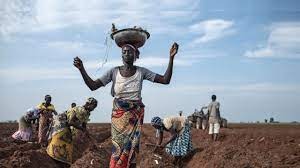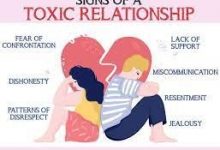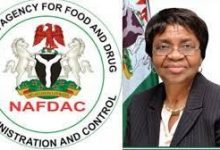Nigeria’s hunger level ‘serious,’ ranks 103 out of 121 countries

Let us consign poverty to the pages of history” “Four in ten Nigerians live on less than $2 a day” “UN chief, CDD task leaders on bending worsening poverty curve” Nigerians with disabilities demand that the government make ending poverty a central issue in the upcoming election.
More than six Nigerians fall into extreme poverty every minute, bringing the total number of impoverished in the country closer to the 95.1 million predicted by the World Bank for this year.
World Bank’s 2022 Poverty and Prosperity Report states that Nigeria is “home to a major share of the global extreme poor,” and that the country is responsible for the severe poverty of three million people worldwide.
Also, last weekend, the 2022 Global Hunger Index (GHI) placed Nigeria at position 103 out of 121 nations, indicating a severe level of hunger in the country. Saturday, in honor of World Food Day, the Welthungerhilfe in Germany and Concern Worldwide in Dublin, Ireland, released their joint Global Hunger Index.
According to the survey, Nigeria has a’severe’ hunger problem, earning a score of 27.3 on a scale from 0 to 100.
Each country is assigned one of five hunger categories on the index: low, moderate, serious, alarming, and extremely alarming. Nigeria has maintained the same position on the index for the second year running. Nigeria, the most populous country in Africa, ranks 103 out of 116 countries in 2021 and 98 out of 107 countries in 2020.
The World Bank estimates that between June and November of this year, one million more Nigerians fell into poverty, bringing the total number of poor Nigerians to 91 million.
Compared to the previous poverty estimate of 89 million people, provided by the National Bureau of Statistics (NBS) in May 2020, the current estimate places nearly half of the country’s estimated population of about 214 million people in poverty. That’s enough people to make it the poverty capital of the world in just two years, with an additional 6.1 million people falling below the poverty line.
In absolute terms, India’s vast population means that more Indians live in poverty (defined as an annual income of less than $2 per person) than any other country, but in terms of proportion, India ranks second to Nigeria, which has 32 percent of the world’s poor.
There were claims that the combined effects of the COVID-19 crisis and increased population had helped reduce the poverty rate. It’s been 30 years since the United Nations declared October 17 to be International Day for the Eradication of Poverty (IDEP). As we mark the International Day for the Eradication of Poverty, we face a hard truth: the world is sliding backwards,” said UN Secretary-General António Guterres in his speech to commemorate the day yesterday.
Millions of people were thrown back into poverty as a result of COVID-19, reversing more than four years of development. Widening gaps between haves and have-nots are a worrying trend. Job losses, rising food and energy prices, and the specter of a global recession have all taken a toll on national and personal economies.
Parallèlement, “the climate catastrophe and rising conflicts are generating great hardship, with the poorest people bearing the brunt. Poor nations are being deprived of the means to invest in their economic revival and progress by being refused debt relief and other essential aid. As a result, the SDGs are becoming increasingly unattainable.
Today, the globe is being jolted awake by the International Day to End Poverty. The topic of this year, “Dignity for all in practice,” should serve as a call to arms for immediate worldwide action.
“Movement to fund people-centered solutions, including but not limited to: health and decent work; advancing gender equality and social protection; and reimagining our food and education systems. Take steps to reform a morally bankrupt international monetary system and make it possible for all nations to gain access to capital and debt relief.
Action to aid developing nations in their shift to renewable energy and green economies, which will save the world and create new jobs. Equally important as taking steps toward achieving the SDGs is taking steps toward ending hostilities, mending geopolitical divides, and pursuing peace. Let us use this momentous occasion to recommit ourselves to making the world a better place for everyone. “Let us write poverty off as a thing of the past,” he said.
Despite President Muhammadu Buhari’s claim that his administration would have lifted 10.5 million Nigerians out of poverty between 2019 and 2021, the foremost human rights organization, Centre for Citizens with Disabilities (CCD), yesterday urged Nigerians to make poverty reduction a key campaign issue. The statement honoring IDEP was issued by CCD Director and Executive Director David Anyaele.
International Day for the Eradication of Poverty is observed annually on October 17 to show support for those in extreme poverty, especially the disabled, women, and children.
“It is also a day of sober contemplation and an occasion to ask ourselves questions as a people on the extent to which we have contributed to the increase or elimination of poverty in our societies,” says author Michael Kiernan.
Anyaele claims that the current leadership in Nigeria is to blame for the country’s persistently high poverty rates and the resulting high rate of people living with disabilities, either directly or indirectly.
This disheartening poverty in Nigeria, he says, is caused by poor leadership and institutionalized corruption at the highest levels of government.
“Unfortunately, when people are living in poverty, their chances of being disabled increase, as poverty has been connected as a primary cause of disability. At the same time, though, disability can force families into deep poverty.
We urge all Nigerians to make poverty alleviation a central topic in the upcoming 2023 elections. All candidates for state legislatures, governorships, the National Assembly, and the Presidency in Nigeria should be required to explain their plans to reduce poverty in the country. Since the poverty problem in Nigeria is man-made, largely as a result of weak governance, citizens should get ready to hold elected officials accountable for alleviating poverty.
All other fundamental rights rest on the foundation of respect for human dignity. While other countries are taking measures to minimize poverty within their societies, the rising number of Nigerians who are facing extreme poverty is highly worrying to us as an organization of, and for, people with disabilities.
World Bank report “A Better Future for All Nigerians: 2022 Nigeria Poverty Assessment” states, “Poverty reduction has stalled since 2015, with more Nigerians sliding below the poverty line over the years. The United Nations predicted that by 2022, 95.1% of Nigerians would be living in poverty.
To paraphrase one source: “Nigeria has been called the world’s poverty capital. This is due to the fact that Nigeria’s rising population is having a hard time keeping up with the country’s worsening poverty.
The UN Conference on Trade and Development (UNCTAD) has predicted that 58 million more Africans will be forced into extreme poverty in 2018. According to the UNCTAD projection for 2022, this would add to the 55 million people who will be forced into extreme poverty as a result of the COVID-19 epidemic.
The report blamed the scenario on the slow growth of Africa’s economy, which is predicted to increase by 2.7% in 2022 and 2.4% in 2023 after a bounce of 5.1% in 2021.
“The economic slowdown imposes further setbacks in the attainment of the 2030 Agenda for Sustainable Development,” stated UNCTAD Secretary-General Rebeca Grynspan.
Debt levels, both private and public, are at historic highs, and the research claims that as a result, about 60% of Africa’s low-income countries are either in debt trouble or at high danger of entering it. As a result, over 60% of African countries require food aid from abroad, and hunger continues to spread across the continent.
When it comes to measuring and monitoring hunger on a global, regional, and national scale, the 2022 Global Hunger Index (GHI) is an invaluable resource. Undernourishment, child stunting, child wasting, and child mortality are the four factors that make up its total score.
According to a 2022 estimate, 12.7% of Nigerians are malnourished. It also revealed that 31.5 percent of children under the age of five are stunted and that 6.5% of children under the age of five are wasting. The study also found that 11.4% of Nigerian youngsters don’t make it to their fifth birthday.
This year, no country was classified as “very worrying.” Previous reports had already forecast a food crisis in Nigeria and its effects on the people, especially children, therefore the country’s ranking on the GHI is not surprising.
‘Fed to Fail,’ a research published by UNICEF in 2021, found that many children under the age of two are not getting enough of the food and nutrients they need to grow and develop normally.
In March, the United Nations’ Food and Agriculture Organization (FAO) released a report predicting that almost 19.4 million people in Nigeria may experience food insecurity between June and August.
The survey also revealed that at the time of its release, a total of 14.4 million people, including 385,000 IDPs across 21 states and Abuja, were experiencing a food shortage.
The widespread violence and instability throughout Nigeria has been blamed for the country’s current food crisis. Boko Haram and the Islamic State’s West Africa Province are just two of the terrorist organizations that have been relentlessly attacking the northern part of Nigeria for the better part of a decade (ISWAP).
On Sunday, the Nigerian National Human Rights Commission voiced its alarm about the country’s worsening food crisis, citing an increase in widespread hunger and a decrease in quality of life as a result. The Commission stated that “insecurity chasing farmers away from their fields, along with several farmlands inundated in water owing to flooding in some sections of the county,” were the main causes of the situation.
Executive Secretary Tony Ojukwu (SAN) of the Commission stated, “the situation, which is partly associated with climate change has worsened access to healthy and nutritious food, leading to increase in widespread hunger and low quality of life and wellbeing of Nigerians, particularly the vulnerable group.”
Ojukwu complained that rising food prices due to insecurity and climate change had made it difficult for many citizens to achieve a decent living due to insufficient access to balanced meals.
Join our 100,000+ members and never miss our members’ exclusive Delsu Breaking News.
Gain Access to Our Private News Room
Popular Stories right now
- Buhari budgets N248bn for Lagos-Ibadan Expressway, roads
- Buhari, Kenyatta present at Ministerial Performance Review Retreat
- Real Madrid defeat Barcelona 3-1 in El Clásico clash




